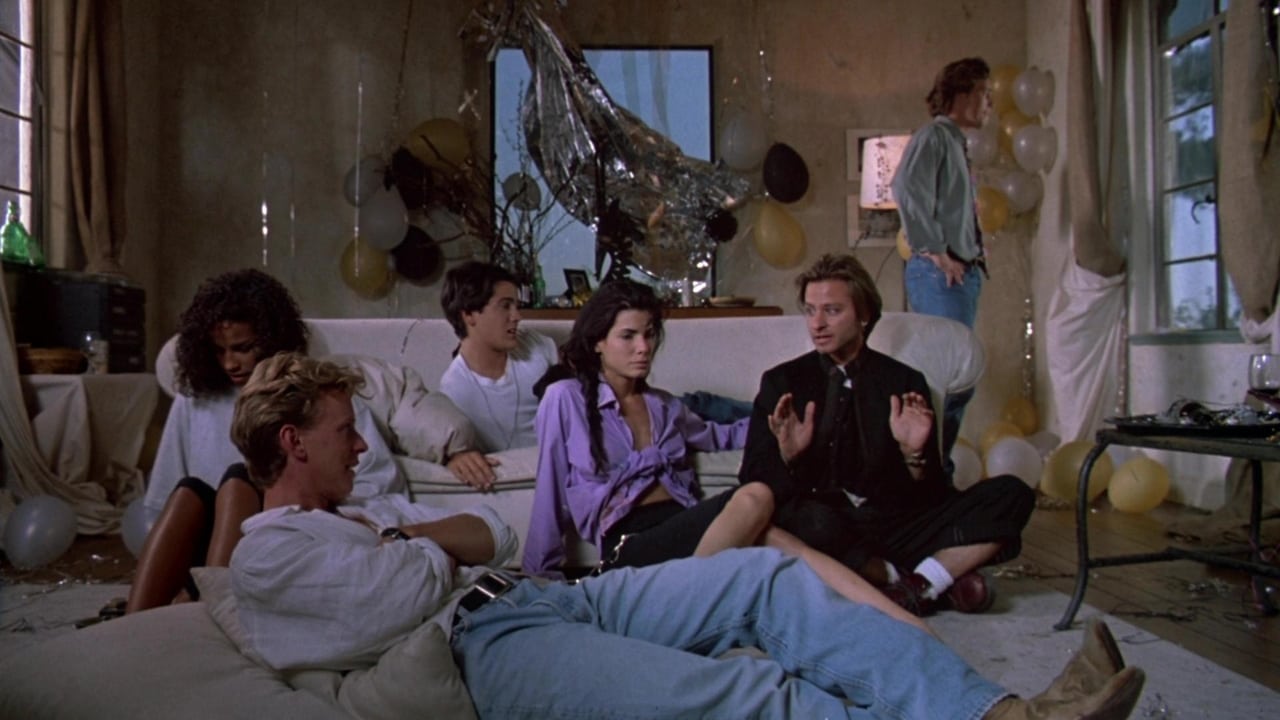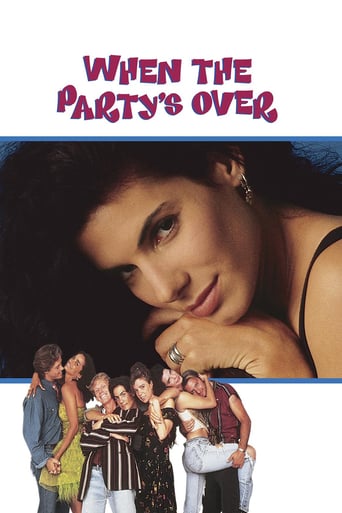

Perfect cast and a good story
... View MoreA very feeble attempt at affirmatie action
... View MoreIt really made me laugh, but for some moments I was tearing up because I could relate so much.
... View MoreBy the time the dramatic fireworks start popping off, each one feels earned.
... View MoreWatching "When the Party's Over", early on I thought I might be witnessing a great, unsung film. But after several tedious later reels the serious mistakes here, in both script revision and casting, became obvious and suitable as a learning set.The ensemble piece, most notably remembered in "The Big Chill" (and of course its template "Return of the Secaucus Seven") is a difficult film to pull off because it lacks the obvious hook of genre films (which seem more popular than ever with new generations of film buffs) and the immediacy and topicality of a "serious" subject movie (see: earlier Oliver Stone or recent Aaron Sorkin films for example).This commendable attempt by Matthew Irmas and his writer & producer collaborators falters for important structural reasons, one of which is of my own devise and will likely elicit ridicule from you gentle readers of my critique, so I will save it for last. Fundamentally, an ensemble follows the principle of "a chain is no stronger than its weakest link", that memorable line spoken by Richard Loo as one of the stereotyped bad guys in the WW II propaganda film "The Purple Heart".Irmas's casting is quite deficient in this regard: his female leads number future superstar Sandra Bullock, in the lead role the iconic Rae Dawn Chong, an all-time favorite for film buffs after "Quest for Fire", and the very talented but failed to make the big time Elizabeth Berridge (peaked almost immediately with "Amadeus"). The guys in the lead roles all do a fine acting job but are comparative nonentities in the shadow of their women.Exception is actually the main problem: Fisher Stevens cast as free spirit Alexander Midnight, who commandeers Bullock's attention (and that of the audience) with an outlandish, tour de force performance. He sticks out in this film the way that Crispin Glover does in all his movies (and Brad Dourif does in many of his) - seemingly a foreign element that dominates all else on view. For an ensemble this is deadly -equivalent to injecting a ham-bone like Jim Carrey into an otherwise well-cast, straightforward drama (imagine Jim showing up prominently in "A Few Good Men" and watching that stagey opus fall apart under his weight). So Act II of this movie is ruined by Stevens' casting -his performance is worth preserving for posterity on its own in perhaps a 30-minute short subject starring him and Bullock.Act III ends up seeming trite and tedious as a result of the Fisher injection, as Irmas & company explode all the carefully established plot time bombs: inevitable Chong/Berridge conflict over their common lover-man; title-implicit breakup of the group with folks moving out of the house and on with their lives; hokey tragedy as in the death of Berridge's Latino protégé.But the sharp dialog, interpersonal insights and excellent acting of the first few, pre-Fisher reels are impressive and could have led to something more. That brings up my final, basically unwarranted personal criticism. I have been campaigning for decades now on a continuum approach to cinema, breaking down the artificial barriers (many of them created by the archaic delivers of content known as video stores and cable channels -both soon to be quite extinct) that pigeonhole movies into types and genres.Principal of these ghetto genres is Adult Entertainment, or porn. At the time "When the Party's Over" was made (it bears a 1991 copyright), the great porn actor/director Paul Thomas was routinely cranking out wonderful interpersonal dramas like his most famous "The Masseuse", but they were rated XXX. Irmas's film is fundamentally about sex, but its presentation is squeaky clean, even avoiding several Chong nude scenes in a silly, prudish manner. In an ecumenical cinema world he could have shot XXX just like P.T. did, without destroying his script or premise, and not only fleshed out Chong's character but given the world Sandra Bullock in all her glory at an early age. In our practical world this is impossible, but the movie (plus excising Stevens' role) could have been a terrific one minus self-censorship or any other kind of censorship.
... View MoreOther than seeing a young Sandra Bullock looking cute in a film that was made before she was a star, there is not a lot of positive things I can say. Several young people share an apartment, joined together by Rae Dawn Chong's character, MJ (that in itself should be a tipoff because I cannot remember a Chong movie post-Commando). Tensions mount at the big party and MJ's self-destructive personality causes the friends to break up when the party ends including a couple that just got engaged during the party.There are some uncomfortable scenes such as when Bullock's 16 year old brother jumps into bed with MJ and says that she will be the one to "deflower" him and then immediately falls asleep. Basically, the movie had the same effect on me!
... View MoreYes, this is an ensemble piece, and a "year in the life of" type of film -- but a fine example of what can be accomplished in this area, for those who appreciate these works. Bullock does act well here -- she's not especially likeable, for several reasons -- but she's believable, and it's one of a handful of roles she's done exceptionally well. Fisher Stevens steals this show, however. And how! He's an entirely winning character -- among a bunch of twenty-somethings who haven't quite figured themselves out, let alone what they want or what makes living worth all the fuss. Many of them are interesting or quite appealing, all the same. Without Stevens setting the counterpoint, a person who wins at life whether he gets what he wants or not, someone who doesn't decide ahead of time what's supposed to happen and how people are supposed to respond to him -- without him in this role, it would be just another story of searching and/or alienation. Not that there haven't been some fine films of just that sort, but this is something more. "When the Party's Over" stands up well alongside such films as "Bob & Ted & Carol & Alice" and the Australian film "Bob's Party" (if I'm remembering the latter's title correctly here). Those films are superficially more entertaining, clearly more commercial, even more conventional -- and more about actual parties and sexual games than this one. But all of them share the same group spirit. In the long run, a decade or more later, it is Fisher Stevens' role as Alexander which lives on in my mind and heart more than any of the others. Nor will I forget Bullock or Rae Dawn Chong and their characters in this film. The story builds slowly, doesn't go where you expect it to or hope it will, but rewards those who are patient and observant.
... View MoreI don't like movies about relationships, so I didn't like this one. The main reason for watching this movie was Sandra Bullock. But she's not seen much. If you expect to see Sandra Bullock in an R movie, keep in mind, there are some sexual scenes, but absolutely no nudity.
... View More